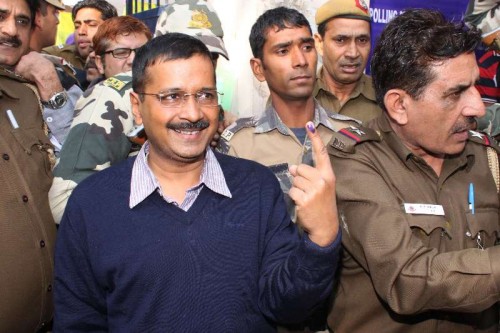
Hundreds of thousands voted enthusiastically across the Indian capital in assembly elections that both the BJP and the AAP claimed they will win.
While balloting was initially slow in many middle and upper middle class areas, polling stations in low income localities witnessed virtual mobs right from the time the exercise began at 8 a.m.
Among the early voters were former chief minister and AAP leader Arvind Kejriwal and BJP’s chief ministerial candidate Kiran Bedi besides Congress leader Ajay Maken and Congress president Sonia Gandhi.
Prime Minister Narendra Modi urged voters to exercise their franchise in large numbers.
“I particularly call upon my young friends to vote in record numbers,” he said.
Central minister Harsh Vardhan, a prominent leader of the Bharatiya Janata Party in Delhi, said in Krishna Nagar, Bedi’s constituency: “I am 100 percent confident that the BJP will win.”
Bedi voted in a government school in south Delhi, flashed a V sign and asked people to vote for a “clean, literate and safe Delhi”.
“Today is a historic day for Delhiites. It’s the day for them to decide what type of Delhi they want,” said the country’s first woman police officer, picked by Modi to lead the BJP charge in the capital.
Journalist-turned-AAP leader Ashutosh told IANS: “We are confident of winning and forming a government in Delhi. According to our estimates, we will win 40-42 (of the 70) seats.”
Congress leader Maken said he too was confident of his party’s win. “The Congress can deliver its promises.”
Election Commission officials said a quarter of Delhi’s 13.3 million electorate had voted by noon, or in the first four hours. Police reported no major disturbance.
Although the Congress, which ruled Delhi for 15 long years until December 2013, is also in the race, most analysts admit that the Delhi battle is mainly between the BJP and the Aam Aadmi Party (AAP).
The elections are taking place a year after Kejriwal resigned after being the chief minister for 49 tumultuous days. His party won a stunning 28 seats in its election debut in 2013.
There are 673 candidates in the fray now. Voting is taking place in 11,763 centres, located in schools.
Many initial voters in middle class and posh areas were early morning walkers. There were also those employed in neighbouring Haryana and Uttar Pradesh who had to go to work after voting.
Police patrolling was visible across the city.
“I have cast my vote,” said Ravi Kumar, a resident of Malviya Nagar in south Delhi, showing off his left forefinger with the purple indelible ink stain on it as proof.
Added east Delhi resident Rajendra Sharma: “It is our duty to vote.”
Kejriwal issued a morning appeal to voters in Delhi vote. “Do cast your vote, you will certainly win.”
He also urged people not to take liquor or money from political parties.
Vice President Hamid Ansari also showed his index finger to the media after voting in the heart of the city.
President Pranab Mukherjee also went to the polling booth but did not vote. He had not voted in the 2014 Lok Sabha election too, saying the president must be above party politics.